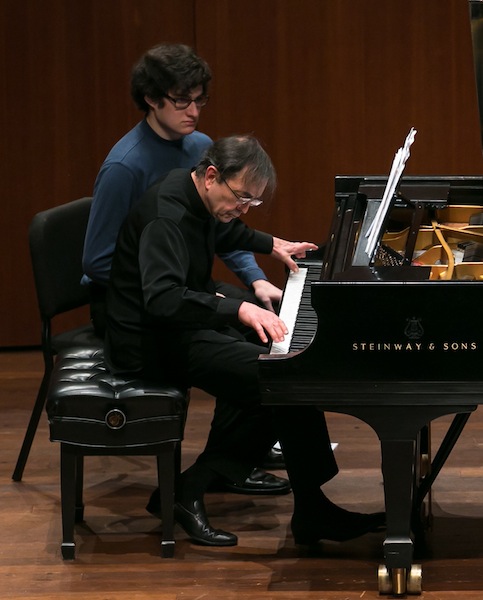Aimard wraps a Ligeti series in Chicago with precision and intensity

Pierre-Laurent Aimard performed music of Ligeti and Beethoven Tuesday night at the Logan Center. Photo: Elliot Mandel
The University of Chicago Presents’ season-long festival devoted to György Ligeti reached its much-anticipated finale Tuesday night. Pierre-Laurent Aimard brought a pairing of Ligeti and Beethoven to the packed house.
The French pianist threw the series a bit of a curve just a week out by revising his scheduled program. Rather than playing 12 of Ligeti’s 18 Etudes, Aimard offered only five Etudes Tuesday night, with the lion’s share of the first half devoted to Ligeti’s Musica Ricercata.
Completed in 1953, this early work shows Ligeti’s genius for mining a myriad of riches out of limited means. Musica Ricercata is cast in eleven brief parts with the first section built on just two pitches, the second on three, and so on.
Aimard made such a compelling case for these idiosyncratic miniatures that it largely overcame disappointment about the program change. The pianist’s blend of precision and spontaneity charted the steep contrasts in material and dynamics, bringing out the jaunty esprit, the tolling valedictory quality of the two homages (to Bartok and Frescobaldi) and the restless morphing of the music–as in No. 4 where an off-kilter waltz grows more frantic and rhythmically chaotic.
Ligeti’s Etudes are mature works, collected in three Books (from 1985, 1994 and 2001). The five selections heard Tuesday night (in order, Nos. 12, 2, 8, 3 and 6) all hail from the first two Books.
Though the Hungarian composer was not a noted pianist himself, Ligeti was keenly alive to the unique sonic and rhythmic properties of the modern grand piano. His Etudes exploit the instrument’s resources with remarkable imagination and panache.
Aimard performed with daunting intensity and laser-like concentration throughout these works. The pianist tore through the opening “Entrelacs” (dedicated to Aimard by the composer) with blistering fury and speed. The Impressionistic “Cordes a vide” is light and Debussyian by comparison and was rendered with shimmering delicacy. (“Fem” or “Metal) went with a jaunty joie de vivre followed by the galumphing, enigmatic “Touches bloquees.”
“Warsaw Autumn” is the longest and most difficult of the set and Aimard unleashed his full arsenal on this final excerpt, thrown off with staggering power and bravura.
As with Ligeti in our own recent time, Beethoven in his “Hammerklavier” sonata “enlarged the possibilities of the instrument” said Aimard.
Here as in the Ligeti works, Aimard underlined the eruptive dramatic qualities of Beethoven’s epic Sonata No. 29 in B-flat, Op. 106. At 50 minutes, this largest of the composer’s works in the genre is an interpretive Everest for pianists with its duration and daunting challenges, both technical and interpretive.
The former held no terrors for Aimard, with the pianist attacking the opening chords of the first movement with customary nervy bravura. Yet the ensuing chorale theme felt a bit bland, providing insufficient contrast and repose.
And so it went for the rest of the performance, which never quite coalesced into a convincing whole. Aimard served up the sonata’s musical thunderbolts with bristling intensity but failed to provide the compensating lyricism in contrast. The epic Adagio was charted alertly and skillfully but with a straitened dynamic and expressive palette that left much of the music’s profound depths unexplored. Aimard got little help from the shallow-sounding Steinway, with a lack of weight at the bass end and at least two pingy keys in acute distress.
The pianist was at his best in the finale, bringing clarity and impassioned strength to the massive fugal climax. But ultimately this was a good rather than a great “Hammerklavier” performance, one in which the journey had its hard-won rewards but the mountain vistas remained in the distance.
Pierre-Laurent Aimard performs 8 p.m. Thursday at Carnegie Hall in New York and 5:30 p.m. Sunday at Shriver Hall in Baltimore. carnegiehall.org; shriverconcerts.org